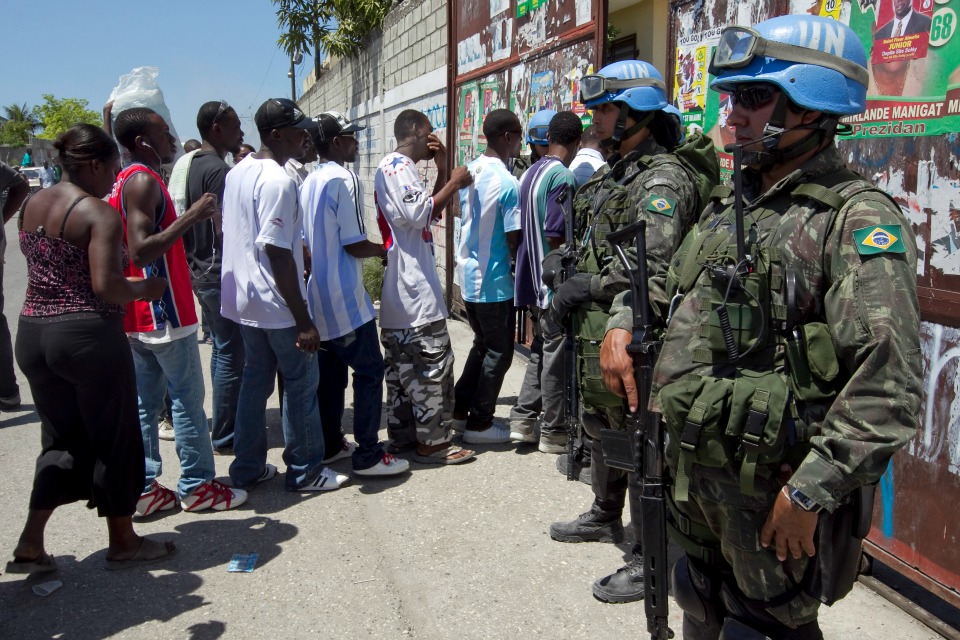"I commend the efforts of all of the Peacekeepers in MINUSTAH for collectively achieving the mission’s objectives."
Statement by Ambassador Peter Wilson of the UK Mission to the UN at the Security Council Debate on Haiti

Thank you Mr President.
I thank the Special Representative of the Secretary-General, Sandra Honoré, for her briefing today.
And I also want to join others in offering our condolences for the passing of General Jaborandy who served MINUSTAH with distinction.
We welcome the Secretary-General’s latest report and we appreciate the valuable contribution that MINUSTAH has made to stability and progress in Haiti. I will focus my statement today on three key points: the collective achievement in stabilising Haiti; the expected drawdown of MINUSTAH by the end of 2016; and the need for early planning for a successor UN presence.
Mr President,
As I set out in our last discussion in March, MINUSTAH has successfully delivered for this Council. I commend the efforts of all of the Peacekeepers in MINUSTAH for collectively achieving the mission’s objectives so that we are now contemplating MINUSTAH’s final mandate. We should pause to reflect on what an achievement this is - for Haiti and for the United Nations.
In January, this Council had an opportunity to see firsthand the contribution of MINUSTAH. It was also a chance to see the positive steps that Haiti is taking to ensure its own development and security. One such step was the recent holding of the first round of legislative elections and the scheduling of the Presidential election. In the Secretary-General’s words “there are encouraging signs that the political leaders of Haiti have embarked on a positive path.” We agree with this sentiment and encourage all levels of government to continue taking steps down that path over the next six months.
The failure to hold elections in 2014, together with the dissolution of Haiti’s Parliament, led to uncertainty among Haiti’s people. So we also welcome the formation of an Electoral Council, the publication of the electoral Decree and the announcement of the electoral calendar.
Mr President,
We are pleased that the most recent report of the Secretary-General on MINUSTAH makes a positive overall assessment of the security situation in Haiti and that it confirms that important progress has been achieved.
For example, and as you have just told us now Sandra, the recent polls in August were notably calmer than the previous election cycle. As noted by the Secretary-General, this was testament to the increased capacity of Haiti’s institutions to take on greater responsibility in leading the country’s democratic processes.
There has been no increase of insecurity or violence in the Departments from which the military component withdrew.
Similarly, the statistics on the performance of the Haitian National Police, who are demonstrating an increasing ability to operate without MINUSTAH’s support, are impressive. For example, demands for MINUSTAH crowd control support to the ten Departmental Units for Crowd Control have dramatically reduced from 146 incidents to 18 over the last two reporting periods. We do of course recognise, however, that there is more to be done in increasing police numbers and expertise.
These enhanced capabilities can be seen as successes for both MINUSTAH and the Haitian National Police, but the real victory is for the people of Haiti. Their peace of mind and hope for a more stable and secure future grows with every step their national institutions take forward.
But the final success of MINUSTAH will be to build on these achievements by planning a smooth transition to a successor UN presence.
This Council has always been clear that the main role of MINUSTAH is to help Haiti take back responsibility for its security. And while MINUSTAH undoubtedly still has a stabilisation role to play in Haiti during the electoral period, I think we can agree that it is right that this mission continues to consolidate, increasingly focusing on bespoke areas where it can offer the greatest support to a stable Haiti.
This is precisely why transition planning needs to start early - to ensure that Haiti has the support it needs post MINUSTAH. By starting the planning early, we can provide the United Nations and the new Haitian government the time they need to prepare for a smooth transition.
Mr President,
With an electoral process finally under way, Haiti now has the opportunity to put behind it the uncertainty of the last few years and start planning for a future where it has full responsibility for its own security.
Thank you.